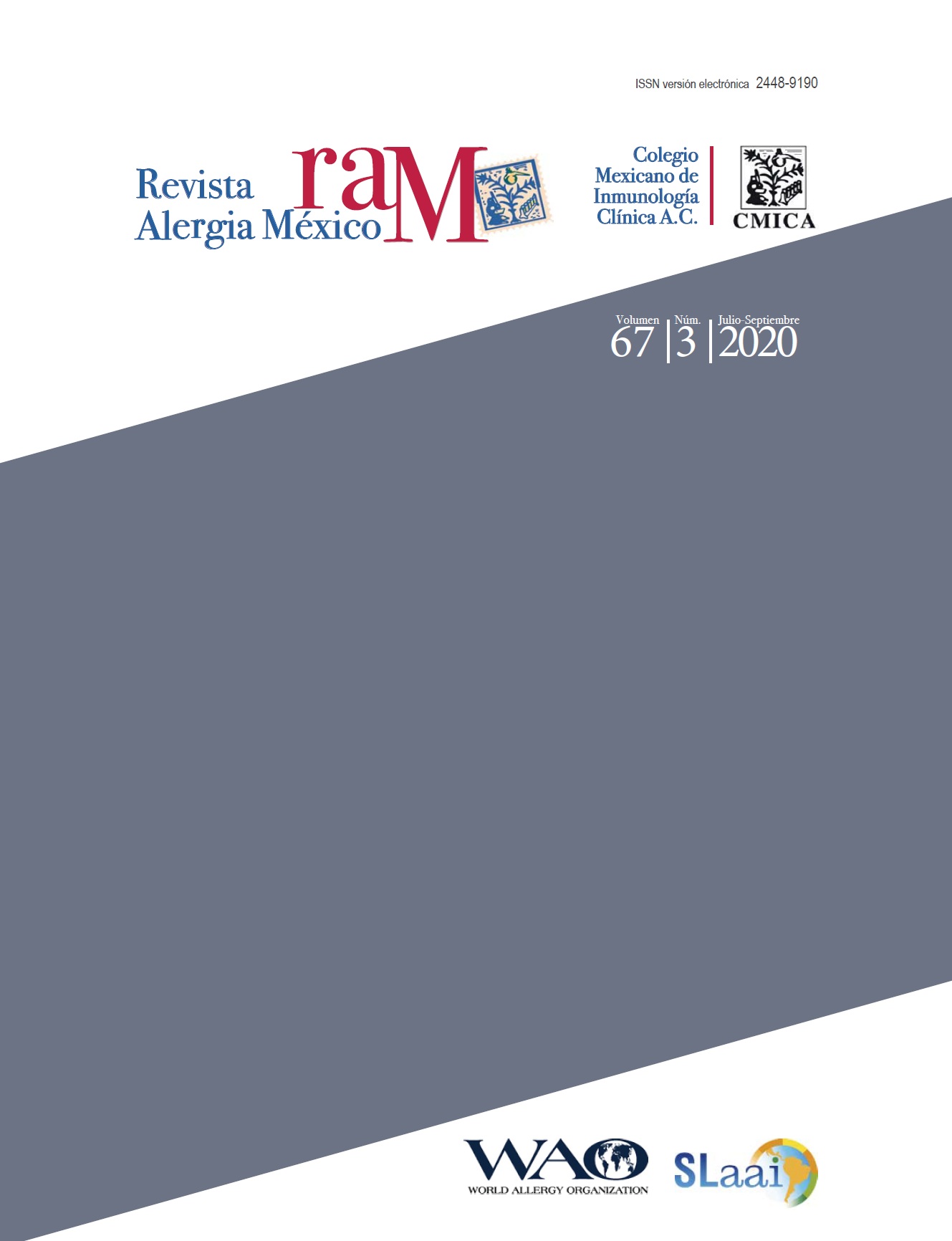Abstract
In 2017, the Pediatric Hospital of Sinaloa (PHS) began its affiliation to the registry of patients with primary immunodeficiency or inborn errors of immunity (IEI) on the platform of the Latin American Society for Immunodeficiencies (LASID). During this period, twelve cases with IEI have been diagnosed and treated at the hospital. The age category at the time of diagnosis varied from two days to sixteen years old, and the range of the onset of the symptoms varied from nineteen days to four years, with a predominance of males (67%). The most frequent IEI was predominantly antibody deficiency (33.3%), followed by defects in the number or function of phagocytes (16.6%), autoinflammatory disorders (16.6%), immunodeficiencies that affect cellular and humoral immunity (16.6%), combined immunodeficiencies associated with syndromic findings (8.3%), and defects in intrinsic and inborn immunity (8.3%). 84% of patients received intravenous immunoglobulin and, in one case of a patient with Wiskott-Aldrich syndrome, a pathogenic variant in the WAS gene was identified; a patient received hematopoietic stem cell transplantation, 33.3% of patients died, of which 25% died of sepsis and 8.3% died of massive hemorrhage. The registry of IEI provides information about epidemiological data, incidences, prevalence, diagnoses, and treatments, which will favor the development of new health policies for obtaining resources and tools to improve the care models.
References
Tangye SG, Al-Herz W, Bousfiha A, Chatila T, Cunningham-Rundles C, Etzioni A, et al. Human inborn errors of immunity: 2019 update on the classification from the International Union of Immunological Societies Expert Committee. J Clin Immunol. 2020;40:24-64. DOI:10.1007/s10875-019-00737-x
Grimbacher B. The European Society for Immnunodeficiencies (ESID) registry 2014. Clin Exp Immunol. 2014;178(Suppl 1):10-20. DOI: 10.111/cei.12496
Costa-Carvalho, B., González-Serrano, M., Espinosa-Padilla, S., & Segundo, G. (2016). Latin American challenges with the diagnosis and treatment of primary immunodeficiency diseases. Expert Rev Clin Immunol. 2017;13(5):483-489. DOI: 10.1080/1744666x.2017.1255143
Bousfiha A, Jeddane L, Picard C, Al-Herz W, Ailal F, Chatila T, et al. Human inborn errors of immunity: 2019 update of the IUIS phenotypical classification. J Clin Immunol. 2020;40(1):66-81. DOI: 10.1007/s10875-020-00758-x
Reporting & statistics [En línea]. European Society for Immunodeficiencies: 2020. Disponible en: https://cci-reporting.uniklinik-freiburg.de/#/
Zelazko M, Carneiro-Sampaio M, Cornejo-de Luigi M, García-de Olarte D, Porras-Madrigal O, Berrón-Pérez R, et al. Primary immunodeficiency diseases in Latin America: first report from eight countries participating in the LAGID. Latin American Group for Primary Immunodeficiency Diseases. J Clin Immunol. 1998;18(2):161-166. DOI:10.1023/a:1023255102170
LASID [En línea]. Latin American Society for Immunodeficiencies; 2020. Disponible en: https://lasidregistry.org/lasid/statistics/view
Hospital Pediátrico de Sinaloa “Rigoberto Aguilar Pico” [sitio web]. Bienvenida. Disponible en: http://hospitalpediatrico.org/index.php/para-m %C3 %A9dicos/residencia-en-pediatr%C3 %ADa/antecedentes-historicos.html. [Consultado 2020 Aug 10].
European Society for Immunodeficiencies [sitio web]. Países Bajos: Diagnostic criteria PID; 2020. Disponible en: https://esid.org/Education/Diagnostic-Criteria-PID
Seidel MG, Kindle G, Gathmann B, Quinti I, Buckland M, van Montfrans J, et al. The European Society for Immunodeficiencies (ESID) Registry Working Definitions for the Clinical Diagnosis of Inborn Errors of Immunity. J Allergy Clin Immunol Pract. 2019;7(6):1763-1770. DOI: 10.1016/j.jaip.2019.02.004
García-Domínguez M, de la O-Espinoza EA, Cruz-Muñoz M. Aneurisma aórtico en un paciente con síndrome de Wiskott-Aldrich. Rev Alerg Mex. 2020;67(1):87-93. DOI: 10.29262/ram.v67i1.696
El-Helou SM, Biegner AK, Bode S, Ehl SR, Heeg M, Maccari Me, et al. The German National Registry of Primary Immunodeficiencies (2012-2017). Front Immunol. 2019;10:1272. DOI: 10.3389/fimmu.2019.01272
Pilania RK, Chaudhary H, Jindal AK, Rawat A, Singh S. Current status and prospects of primary immunodeficiency diseases in Asia. Genes Dis. 2019;7(1):3-11. DOI: 10.1016/j.gendis.2019.09.004
Erjaee A, Bagherpour M, Van Rooyen C, et al. Primary immunodeficiency in Africa-a review. S Afr Med J. 2019;109(8b):3-11. DOI: 10.7196/SAMJ.2019.v109i8b.13820
García-Cruz ML, Camacho R, Ortega-Martell JA, Berrón-Pérez R, Espinoza-Rosales F, Hernández-Bautista V, et al. Registro de inmunodeficiencias primarias en pacientes mexicanos en una institución de tercer nivel: experiencia de 30 años. Ale As Inmunol Ped. 2002;11(2):48-66. DOI: https://www.medigraphic.com/pdfs/alergia/al-2002/al022d.pdf
Espinoza-Padilla S, et al. Capacitación en hospitales de México para el diagnóstico de enfermedad granulomatosa crónica por la técnica de 1-2-3 dihidrorodamina. Alerg Asma Immunol Pediatr. 2015;24(2)68-72. Disponible en: https://www.medigraphic.com/pdfs/alergia/al-2017/al173b.pdf
Contreras-Verduzco FA, Morales-Vázquez AM, Medina-Torres E, Espinosa-Padilla S. Diagnóstico oportuno de la inmunodeficiencia combinada grave (SCID) a través del tamiz neonatal. Alerg Asma Immunol Pediatr. 2014;23(2)48-56. Disponible en: https://www.medigraphic.com/pdfs/alergia/al-2014/al142d.pdf
Mogica-Martínez MD, Vázquez-Leduc A, Ortega-Martell JA, Gómez-Alonso C, Rodríguez-Orozco AR, Rico-Arroyo M, et al. Validación de la escala PRIDE (Primary Immunodeficiency Disease Evaluation) para determinar nivel alto de sospecha de inmunodeficiencia primaria en población mexicana. Rev Alerg Mex. 2012;59(4):192-198.
Álvarez-Cardona A, Espinosa-Padilla SE, Reyes-Lugo SO, Ventura-Juárez J, López-Valdez JA, Martínez-Medina L, et al. Primary immunodeficiency diseases in Aguascalientes, Mexico: results from an educational program. J Clin Immunol. 2016;36(3):173-178. DOI: 10.1007/s10875-016-0242-0
Saucedo-Aparicio AG, Espinosa-Padilla SE, Bustamante-Ogando JC, López-Jasso F, Rivera-Lizárraga DA. Importancia del diagnóstico genético en las inmunodeficiencias combinadas graves. Acta Pediatr Mex. 2109;40(4):234-251. Disponible en: https://www.medigraphic.com/pdfs/actpedmex/apm-2019/apm194g.pdf
Lugo-Reyes SO, Ramírez-Vázquez G, Cruz-Hernández A, Medina-Torres EA, Ramírez-López AB, España-Cabrera C, et al. Clinical features, non-infectious manifestations and survival analysis of 161 children with primary immunodeficiency in Mexico: a single center experience over two decades. J Clin Immunol. 2016;36(1):56-65. DOI: 10.1007/s10875-015-0226-5
Hernández-Martínez C, Espinosa-Rosales F, Espinosa-Padilla SE, Hernández-Martínez AR, Blancas-Galicia L. Conceptos básicos de las inmunodeficiencias primarias. Rev Alerg Mex. 2016;63(2):180-189. DOI: 10.29262/ram.v63i2.146
León-Lara, X, Hernández-Nieto L, Zamora CV, Rodríguez-D’Cid R, Cortés-Gutiérrez ME, Espinosa-Padilla S, et al. Disseminated infectious disease caused by histoplasma capsulatum in an adult patient as first manifestation of inherited IL-12Rβ1 deficiency. J Clin Immunol. 2020;40(7):1051-1054. DOI: 10.1007/s10875-020-00828-0
Blancas-Galicia L, Santos-Chávez E, Deswarte C, et al. Genetic, immunological, and clinical features of the first mexican cohort of patients with chronic granulomatous disease. J Clin Immunol. 2020;40(3):475-493. DOI: 10.1007/s10875-020-00750-5
Sáez-de Ocariz M, Suárez-Gutiérrez M, Migaud M, Casanova JL, Segura-Mendez NH, Espinosa-Padilla SE, et al. Rosacea as a striking feature in family members with a STAT1 gain-of-function mutation. J Eur Acad Dermatol Venereol. 2020;34(6):e265-e267. DOI: 10.1111/jdv.16241

This work is licensed under a Creative Commons Attribution-NonCommercial 4.0 International License.
Copyright (c) 2020 Revista Alergia México

